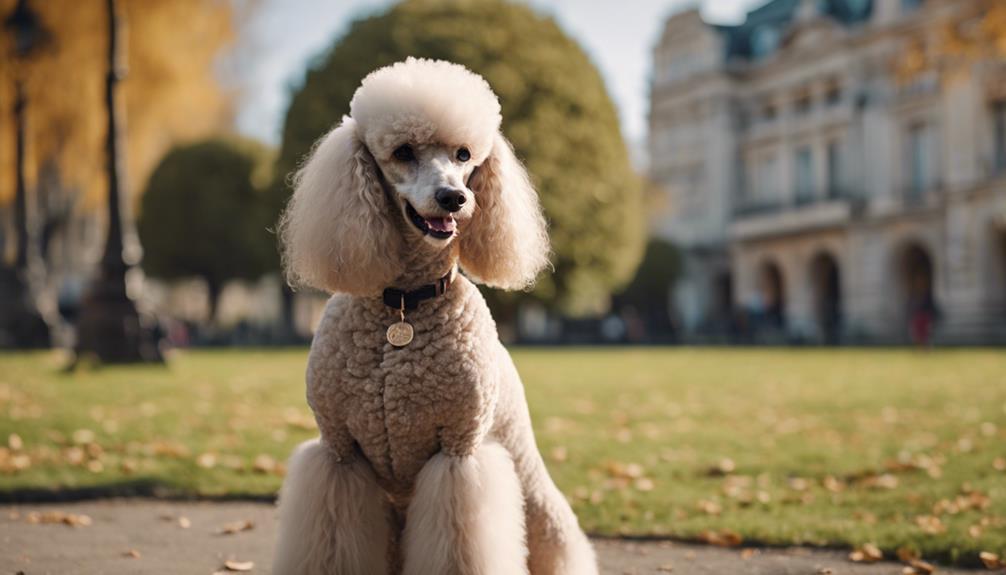When it comes to ensuring a dependable recall response from your poodle, there are effective techniques that can be employed to strengthen this vital skill. By implementing proven methods of positive reinforcement and gradually increasing the level of distractions during training, you can lay a solid foundation for your poodle's reliable recall behavior. Curious to discover more about these techniques and how they can transform your poodle's responsiveness?
Key Takeaways
- Consistent training builds reliable recall behavior.
- Clear cues aid in a dependable response.
- Positive reinforcement strengthens recall reliability.
- Tailored techniques suit Poodles' intelligent nature.
Importance of Reliable Recall Training
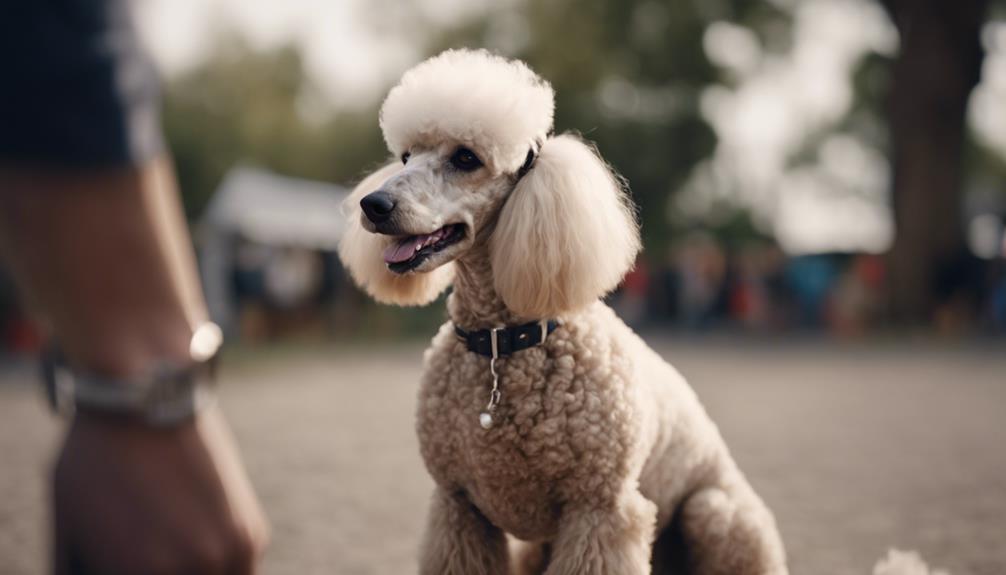
If you want your Poodle to stay safe and listen to you, reliable recall training is absolutely essential. Training your Poodle for a reliable recall is crucial due to their intelligent and independent nature. Poodles, with their strong prey drive, can easily get distracted and chase after small animals if their recall training is not solid. By investing time in recall training, you can prevent your Poodle from running off, getting lost, or engaging in potentially dangerous behaviors. Additionally, a well-trained recall fosters a strong bond between you and your Poodle, enhancing trust and communication.
Consistent recall training is vital for allowing your Poodle to safely enjoy off-leash activities while ensuring they respond promptly to the recall command. Building a reliable recall response takes patience and practice, but the benefits of having a Poodle that listens and stays safe are well worth the effort. Remember, effective communication through recall training is key to a harmonious relationship with your Poodle.
Understanding Poodle Behavior for Recall
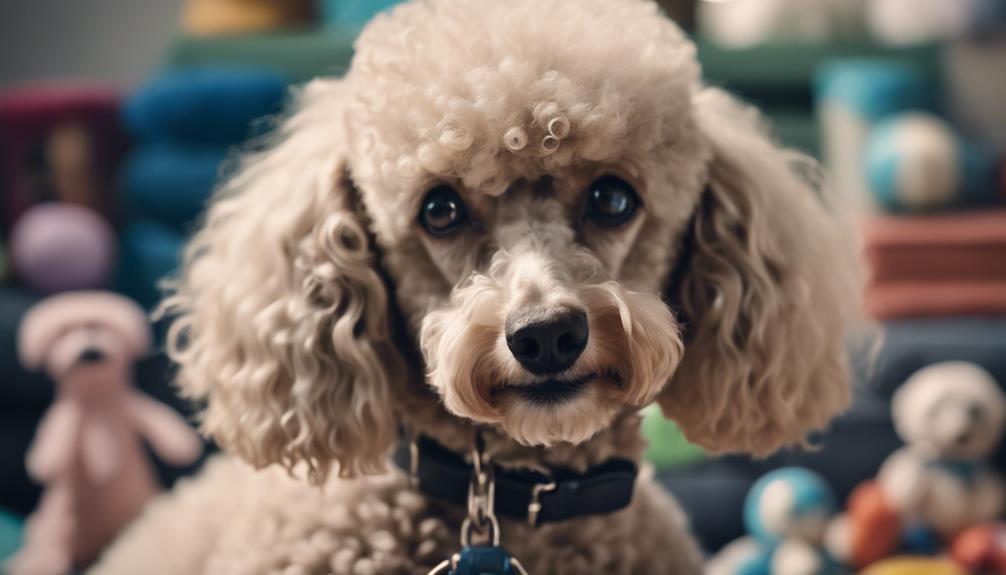
To understand Poodle behavior for recall training effectively, it is essential to recognize their innate intelligence and eagerness to please. Poodles are known for their exceptional trainability and responsiveness to commands, which stems from their high level of intelligence. Their strong bond with owners motivates them to learn and perform tasks to please their beloved humans. Poodles possess keen observation skills, allowing them to pick up on cues from their environment during training sessions. Their high energy levels and playful nature make them enthusiastic partners for recall exercises. Providing mental stimulation is crucial for Poodles, and recall training serves as an excellent way to engage their intelligence and channel their energy effectively. By understanding these aspects of Poodle behavior, you can tailor your recall training techniques to suit their needs and enhance the bond you share with your furry companion. Consistency and positive reinforcement are key components when working with Poodles, as these methods tap into their desire to please and their quick learning abilities. Incorporating treats, praise, and engaging activities into recall training keeps them motivated and focused. Additionally, addressing challenges like mouthing or nipping early on with appropriate poodle puppy biting tips can help ensure that training sessions remain productive and enjoyable for both you and your dog.
Establishing Clear Recall Cues
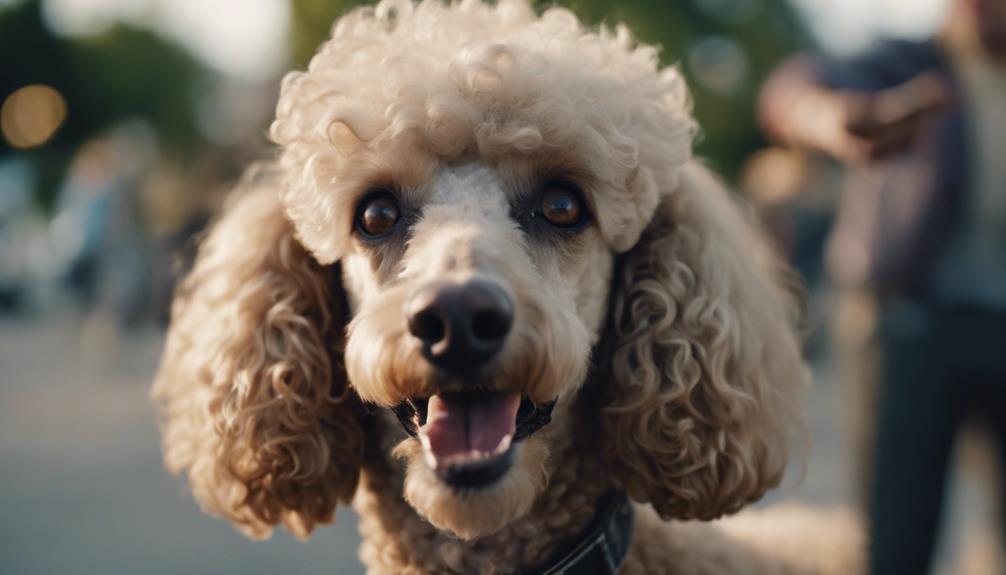
Establishing clear recall cues for your Poodle is essential for effective training and communication. When teaching your Poodle the recall cue, such as 'come' or 'here', ensure it is distinct and not easily confused with other commands. Consistent practice using the same recall cue, rather than common words like 'okay' or 'good', reinforces the association with returning to you. Your recall cue should be clear, concise, and easily understood by your Poodle. To avoid confusion and promote a reliable response, practice the recall cue in various environments. Below is a table summarizing key points to help you establish clear recall cues effectively:
| Key Points |
|---|
| Use a distinct recall cue |
| Consistent practice |
| Clear and concise |
Consistency in Training Sessions
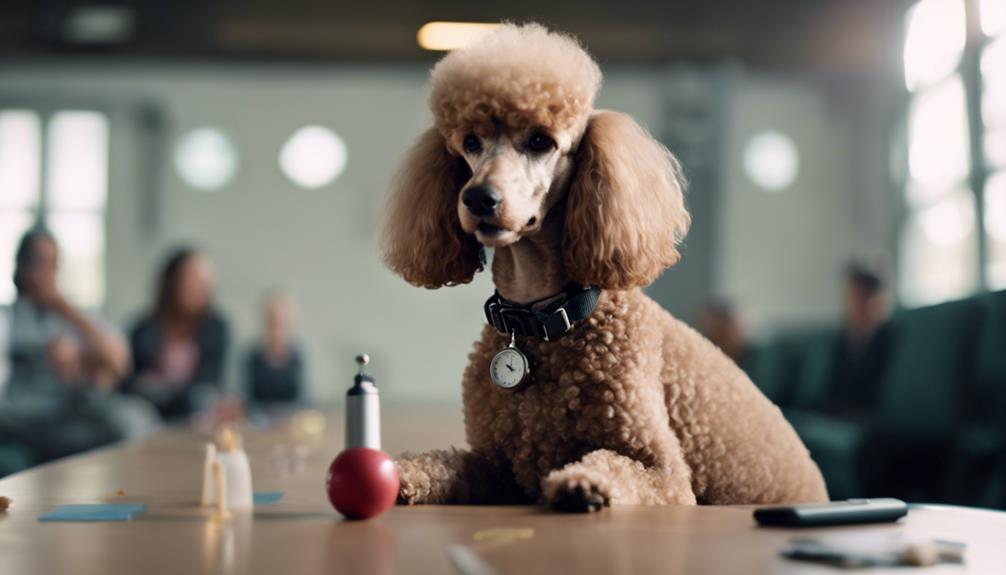
For effective recall training with your Poodle, maintaining consistency in your training sessions is crucial. Consistency involves practicing dog recall training at the same time each day, which helps reinforce the recall behavior in Poodles. By setting a regular training schedule, you are aiding in establishing a reliable response to the recall cue. This consistent approach ensures that your Poodle understands and responds effectively to the recall command. Repetition and consistency play significant roles in the development of a dependable recall response in your Poodle. Through regular and consistent training sessions, you are laying the foundation for a strong and reliable recall behavior. Remember, patience and perseverance in your training efforts will lead to the desired response development in your Poodle. Stick to the training schedule, be consistent in your approach, and watch as your Poodle's recall response improves over time.
Incorporating Positive Reinforcement Techniques
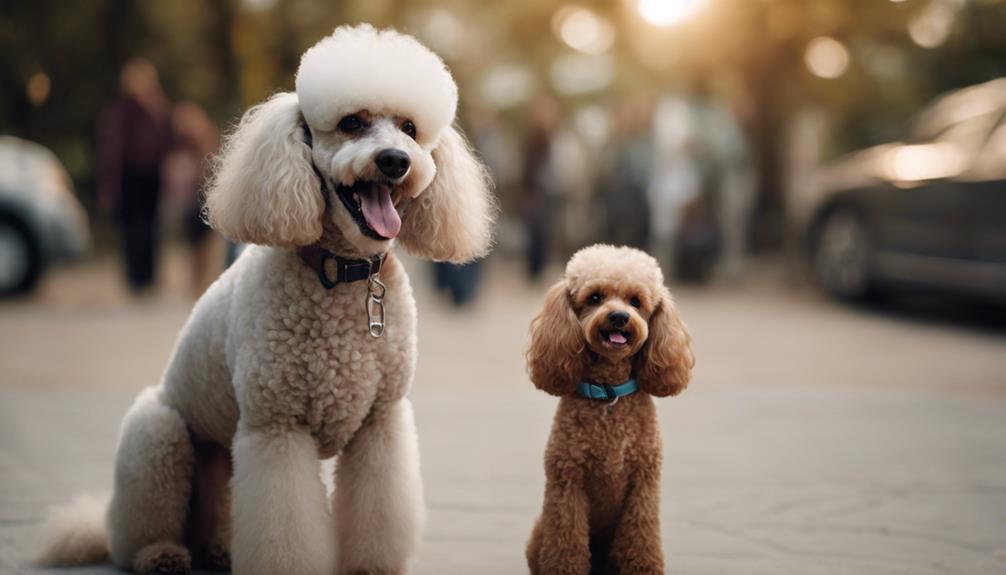
Incorporate positive reinforcement techniques when training your Poodle for recall to strengthen the bond and enhance training effectiveness. Positive reinforcement involves rewarding your Poodle when they exhibit the desired behavior of coming when called. Here are three key ways to effectively incorporate positive reinforcement into your Poodle recall training:
- Use Training Treats: Utilize high-value treats that your Poodle loves to create a positive association with responding to the recall command.
- Provide Consistent Positive Reinforcement: Reward your dog every time they come when called to reinforce the behavior and encourage a reliable response.
- Reward Your Dog with Play and Praise: Along with treats, incorporate playtime and enthusiastic praise to make the training sessions enjoyable and engaging for your Poodle.
Addressing Common Recall Challenges
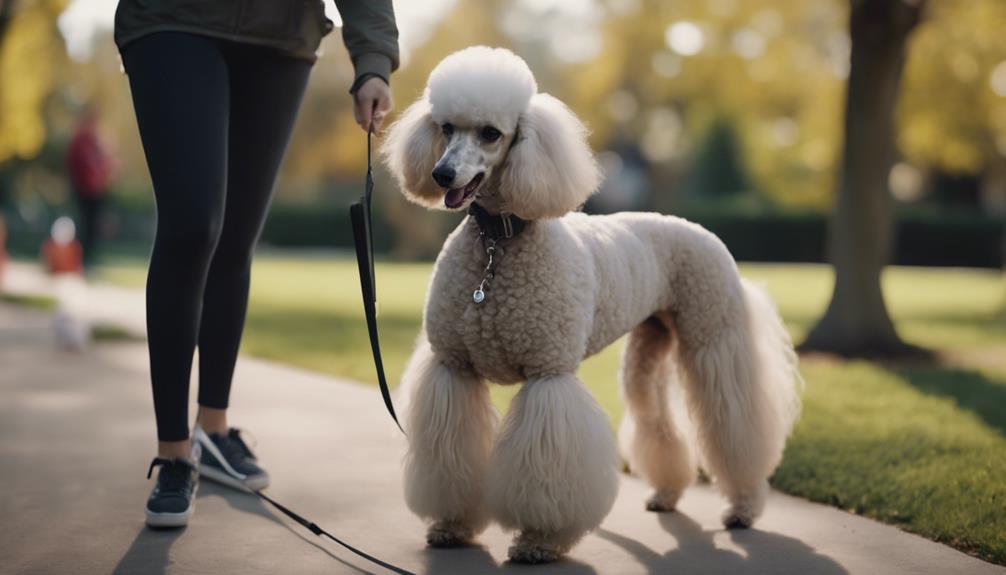
To overcome common recall challenges in Poodle training, it's crucial to understand the factors that may hinder your Poodle's response when called and address them effectively. Distractions, lack of motivation, fear, or anxiety can all impact your Poodle's ability to come when called. When training your dog for recall, it's essential to use positive reinforcement techniques that cater to your Poodle's individual needs. By providing rewards that are highly valued by your Poodle, you can increase their motivation to respond reliably.
Structured training sessions can help address these challenges by creating a consistent environment for learning. Professional trainers or behaviorists can offer guidance tailored to your Poodle's specific issues, helping you navigate obstacles and improve your Poodle's recall response. Remember that every Poodle is unique, so adapting your training methods to suit their personality and preferences is key to achieving a reliable recall. By addressing these common challenges with patience and tailored approaches, you can work towards a more dependable recall response from your Poodle.
Building Trust for Effective Recall
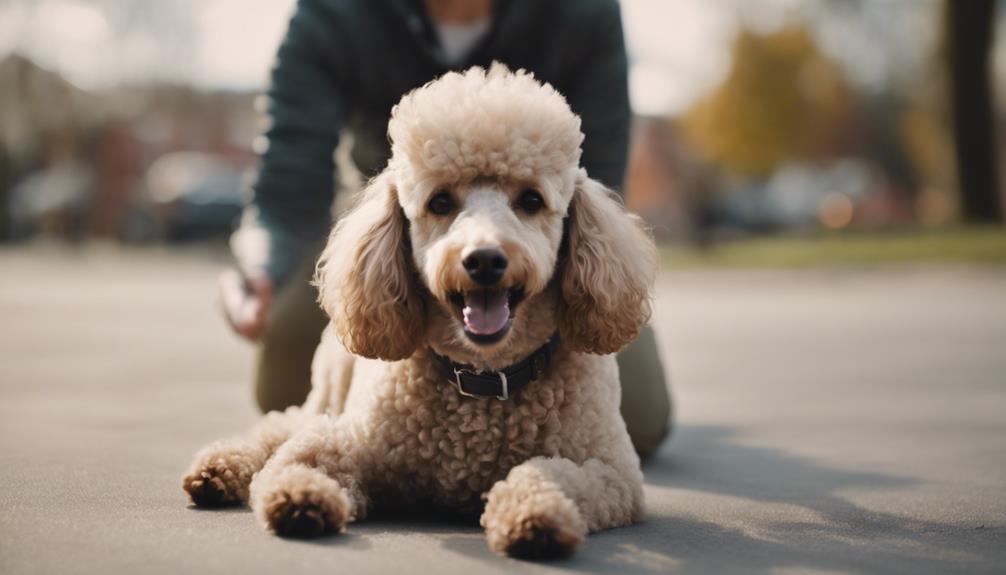
To build trust for effective recall, focus on bonding with your Poodle and maintaining consistency in your training methods. By creating a positive and reliable environment, your Poodle will learn to trust your cues and respond promptly when called. Remember, trust is the key to a strong recall response in your furry companion.
Trust Through Bonding
For effective recall training with your Poodle, establishing trust through bonding is crucial. When you focus on building a strong relationship based on trust, your Poodle will be more inclined to respond reliably to your recall commands. Here are three key ways to enhance trust through bonding with your furry companion:
- Quality Time: Spend dedicated time engaging in activities your Poodle enjoys, such as playtime or leisurely walks. This helps strengthen your bond and build trust.
- Positive Reinforcement: Use treats, praise, and affection to reinforce good behavior during training sessions. Positive reinforcement fosters a positive association with recall commands.
- Consistency: Be consistent in your interactions and training methods. Consistency builds trust and reliability in your Poodle's recall response.
Consistency in Training
Consistently practicing recall commands with your Poodle is key to building trust and reliability in their response. Regular daily practice of these commands reinforces your Poodle's understanding and compliance. Poodles thrive on routine and consistency, making it essential for effective recall training. By maintaining consistency in your training approach, you are setting the stage for successful off-leash experiences. Your Poodle will learn to reliably come when called through your dedication to regular practice and reinforcement. Remember, trust is built gradually through daily consistency in training. Stay patient and persistent in your efforts, and you will see the payoff in your Poodle's reliable response to recall commands.
Implementing Recall Games for Engagement
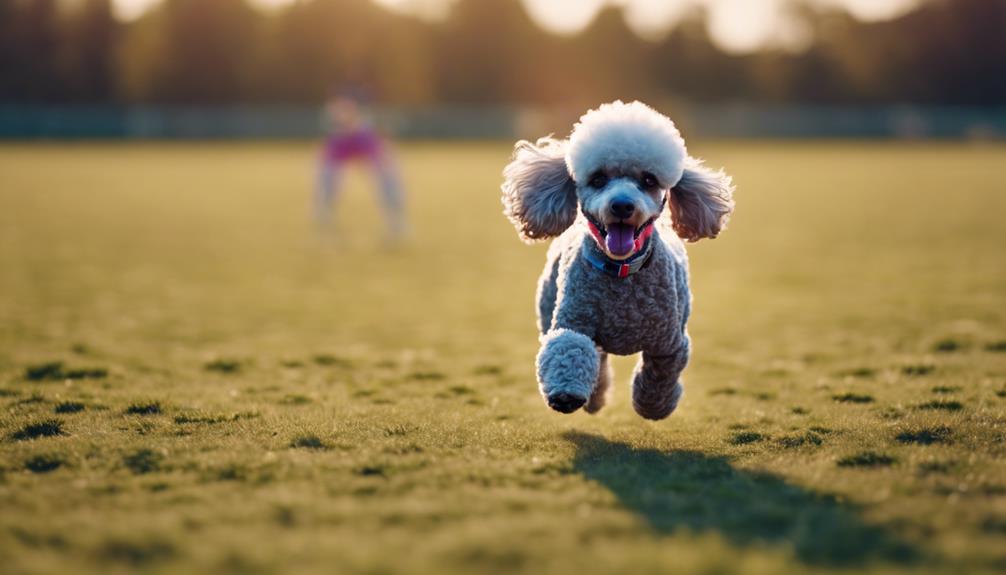
Engage your Poodle effectively in recall training by incorporating fun and interactive games that strengthen their response to your cues. These games not only make training enjoyable but also foster a reliable recall response:
- Puppy Ping Pong: This game involves having two people at a distance from each other, calling the Poodle back and forth. It teaches them to respond promptly to recall cues in a playful manner.
- Hold Me Back: Use this game to create anticipation and excitement. Have someone hold your Poodle gently while you move away, calling them enthusiastically. Release them with a cue like "come," making them eager to reach you.
- Center of the Universe: In this game, be the center of your Poodle's world. Move around, call them to you, reward them, and then release them to explore again. This reinforces the idea that coming when called leads to positive interactions.
Progressing Through Recall Training Levels
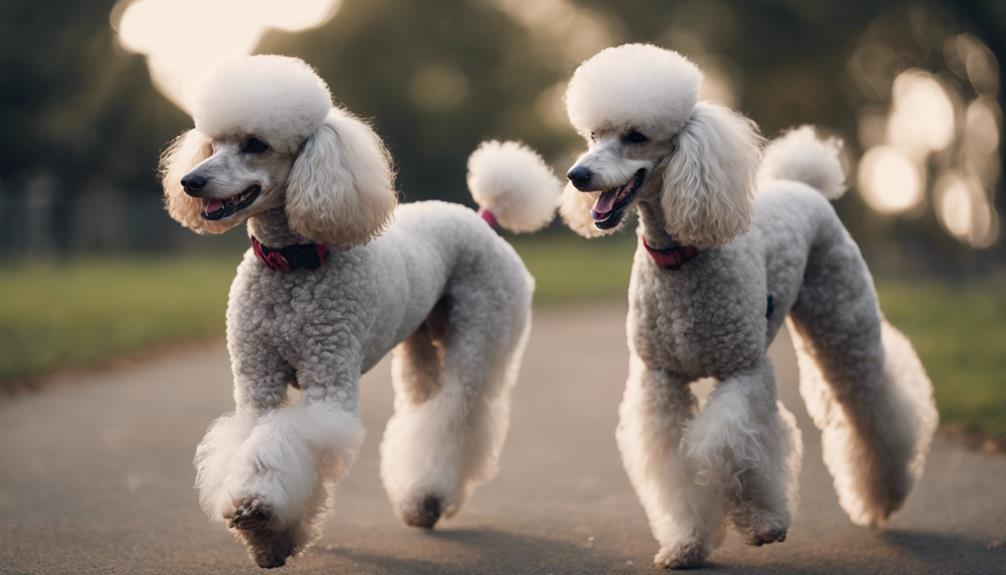
When advancing in recall training with your Poodle, it is essential to progressively introduce varying levels of difficulty to strengthen their response in different environments. Start indoors with no distractions to establish a solid foundation before moving to more challenging settings. Once your Poodle reliably responds indoors, progress to outdoor training in private areas, utilizing a long leash if necessary. This helps acclimate your pup to different surroundings and distractions. Gradually increase the level of difficulty by practicing in public areas with more stimuli to enhance their recall skills. Consistent training is key to developing a reliable recall response in your Poodle. Transition through different training levels systematically to ensure your Poodle's recall behavior is consistent and trustworthy.
| Training Level | Environment | Focus |
|---|---|---|
| Beginner | Indoors | No distractions |
| Intermediate | Outdoors | Private areas |
| Advanced | Outdoors | Public areas |
Training Puppies for Reliable Recall
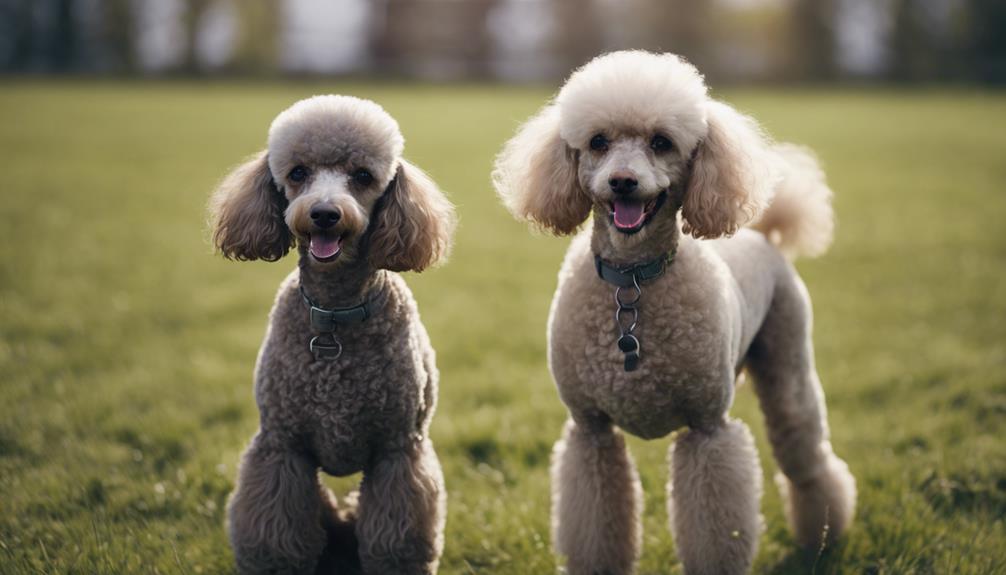
To build a strong foundation for reliable recall in puppies, start training as early as 8 weeks old using high-value treats and positive reinforcement techniques. High-value treats like small pieces of chicken or cheese will keep your puppy motivated and excited to learn. Positive reinforcement, such as praise and pets, will help your puppy associate coming when called with good things. Here are three essential tips for training puppies for a reliable recall:
- Short and Frequent Sessions: Keep training sessions brief but regular to prevent your puppy from getting bored or tired.
- Practice in Various Environments: Train your puppy to come when called in different places like your home, the park, or a quiet street to generalize the command.
- Be Patient and Consistent: Stay calm and consistent in your training approach, rewarding your puppy each time they come when called to reinforce the behavior.
Overcoming Distractions in Recall Training
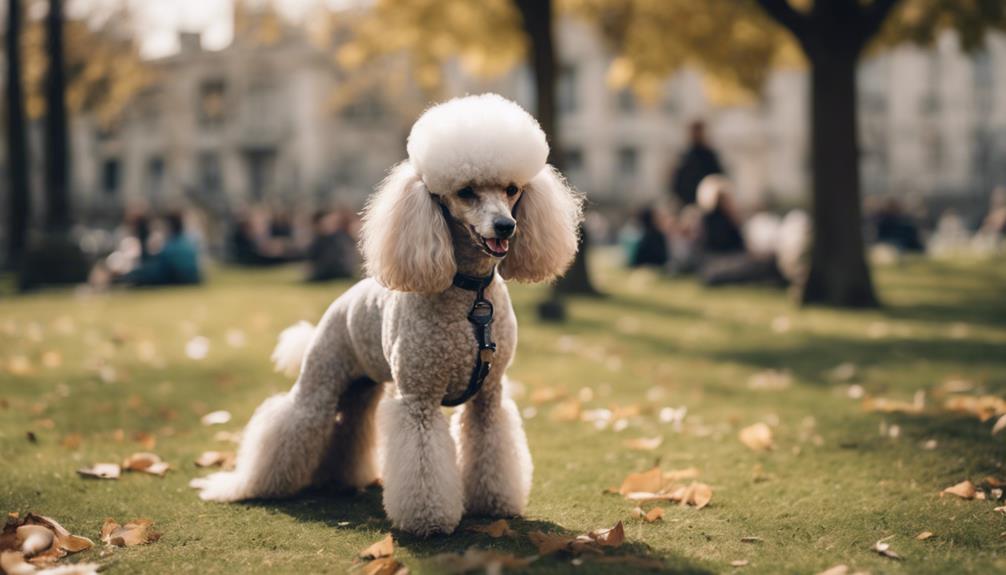
To boost your poodle's recall training success, especially in the face of distractions, consistent exposure to challenging environments is key. Use high-value treats like cooked chicken or freeze-dried liver to maintain focus during training sessions. Practice recall in various settings with different distractions such as squirrels, other dogs, or loud noises. Gradually increase the level of distractions to challenge your poodle's recall response and improve reliability over time. Incorporate real-life scenarios into your training, like calling your poodle away from playing with other dogs, to simulate distractions that may occur in everyday situations. Consistent training in distracting environments will help your poodle generalize the recall command and respond reliably in any circumstance. Remember, patience and persistence are essential as you work towards a reliable recall with your poodle. With practice and dedication, your furry companion will learn to respond promptly and consistently to your recall commands.
Enhancing Recall Speed and Response
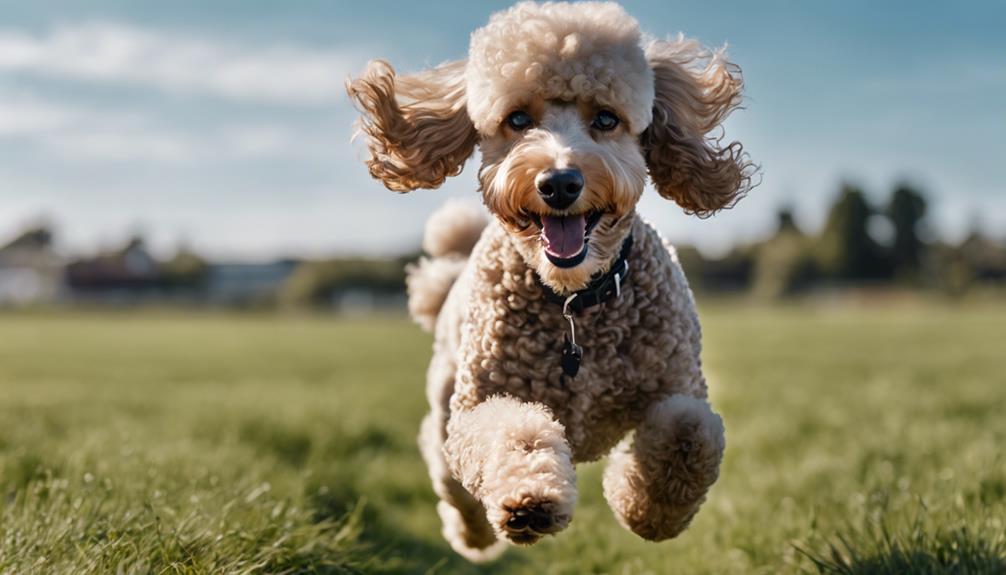
To enhance your poodle's recall speed and response, focus on implementing speed training techniques, establishing reliable recall signals, and maintaining consistency in your expectations and responses. By incorporating these elements into your training sessions, you can help your poodle develop a quicker and more reliable recall behavior. Remember, patience and practice are essential in achieving a fast and efficient recall response from your furry companion.
Speed Training Techniques
Enhance your poodle's recall speed and response by using short, quick cues like a sharp whistle or a single syllable word during training. To improve speed training techniques, consider the following:
- Rapid-Fire Repetition: Repeat the recall cues in quick succession, rewarding immediate responses to reinforce fast reactions.
- Recall Drills: Practice recall drills with escalating speed demands to enhance your poodle's agility and responsiveness.
- High-Value Incentives: Use high-value treats or toys that your poodle adores to motivate quicker recall speeds during training sessions.
Reliable Recall Signals
If your poodle consistently responds to rapid-fire recall cues and drills with high-value incentives, you are ready to further enhance their recall speed and response by focusing on reliable recall signals. Practice using a consistent recall cue, such as 'come' or a unique word, to train your poodle effectively. Utilize high-value treats or toys to motivate and reinforce a quick response to the recall signal. Incorporate positive reinforcement techniques to enhance the speed and reliability of your poodle's recall. Training in various environments will help generalize the recall signal, ensuring a consistent response regardless of the setting. Remember, consistency in training and rewarding your poodle for coming when called will strengthen their recall skills over time, leading to a reliable response.
Consistency in Response
Consistency in your training approach plays a key role in sharpening your poodle's recall speed and response reliability. To enhance recall speed and response reliability, consider the following:
- Establish a Routine: Regular practice sessions create a strong association between the recall cue and the expected response.
- Provide Positive Reinforcement: Consistently offering rewards for desired behavior speeds up your poodle's recall response and enhances reliability.
- Vary Training Environments: While maintaining consistency, training in different environments aids in generalizing the recall behavior.
Transitioning to Off-Leash Recall
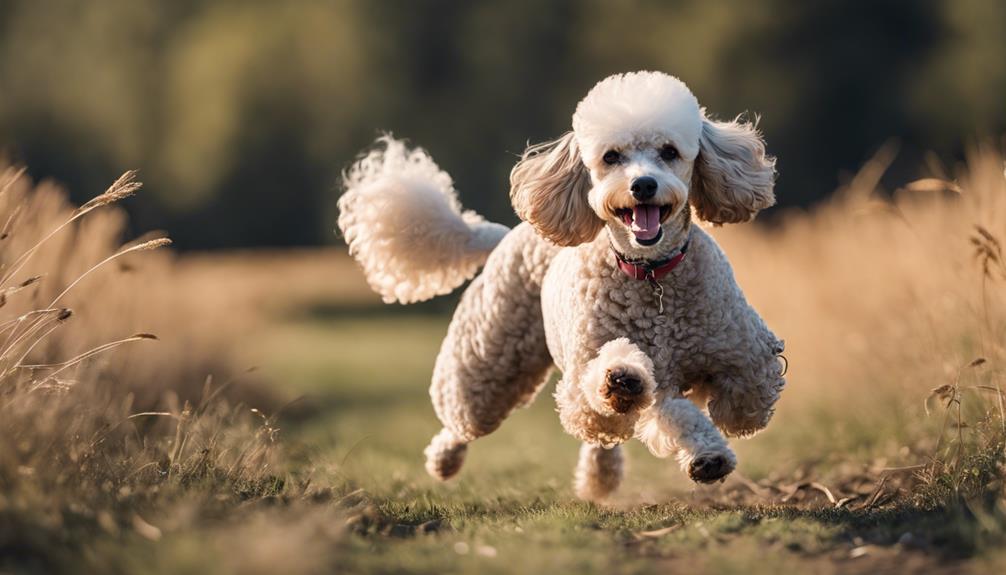
When transitioning your poodle to off-leash recall, start by practicing with a long leash for added safety. This gradual approach helps your poodle understand the expectations of responding reliably even when not physically restrained. Begin in a secure area, free of distractions, to set your poodle up for success. Use high-value treats and enthusiastic praise to reinforce good behavior during off-leash training sessions. Consistency is key in ensuring your poodle maintains a reliable response to recall cues. By consistently practicing in a secure environment and providing positive reinforcement, your poodle will become more confident and responsive during off-leash recalls. Remember, each poodle is unique, so be patient and tailor your training methods to suit your furry friend's individual needs.
| Off-Leash Recall Training Tips | |
|---|---|
| Start with long leash for safety | Use high-value treats |
| Practice in secure area | Provide enthusiastic praise |
| Consistently reinforce training | Tailor methods to poodle |
Safety Measures for Off-Leash Training
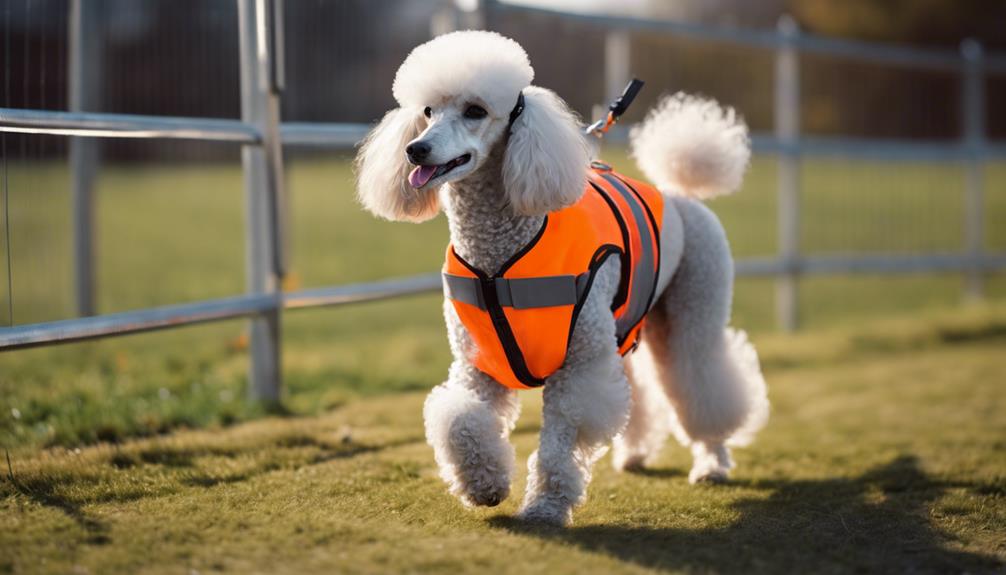
To ensure the safety of your poodle during off-leash training sessions, always make sure they are microchipped and wearing a collar with identification tags. Here are some safety measures to consider:
- Use a training leash: Utilize a long training leash to maintain control over your poodle while practicing recall in safe, enclosed areas. This provides a safety net in case your poodle gets distracted or wanders off.
- Gradually introduce distractions: During off-leash training, gradually introduce distractions to test and strengthen your poodle's recall response. Start with mild distractions and increase the level as your poodle becomes more reliable in responding to your recall command.
- Consider a GPS tracking device: For added safety and peace of mind during off-leash activities, consider using a GPS tracking device or collar attachment. This can help you locate your poodle quickly in case they wander too far. Remember, prioritizing your poodle's safety by supervising closely and being aware of potential hazards is key to successful off-leash training.
Maintaining and Reinforcing Recall Skills

For maintaining and reinforcing recall skills in your Poodle, consistent practice in various environments is essential. Recall training should be a regular part of your routine, using high-value treats like diced chicken or freeze-dried liver to reward your Poodle for coming when called. Incorporating fun games such as fetch or hide-and-seek can make training enjoyable for your Poodle and strengthen their response. Consistency is key; ensure that training sessions are frequent and structured. To maintain a reliable recall, gradually increase the distance between you and your Poodle, as well as introduce distractions to test their response in different scenarios. By practicing in different locations and situations, you help your Poodle generalize the behavior of coming when called. Remember, patience and persistence will pay off in creating a strong and dependable recall response in your beloved Poodle.
Frequently Asked Questions
How Do You Teach a Dog Reliable Recall?
To teach a dog reliable recall, focus on treat motivation, positive reinforcement, and consistency practice. Start in low-distraction settings, gradually increasing difficulty. Use recall cues, play recall games, and practice with a long line for recall distance.
How Do You Fix a Dog That Ignores the Recall?
When your dog ignores the recall, focus on positive reinforcement and consistency. Engage in bonding activities, practice focusing exercises, manage distractions, and work on leash training. Gradually progress to outdoor practice and seek professional help if needed.
How Can I Improve My Recall Training?
To improve your recall training, focus on positive reinforcement, consistent practice, and distraction training. Incorporate recall games, leash training, and boundary training. Use specific recall cues and vary recall rewards to keep your Poodle engaged and responsive. Additionally, gradually increase the level of difficulty by practicing recall in more challenging environments to strengthen your Poodle’s reliability. Introduce advanced Poodle training techniques, such as long-line training and off-leash recalls, to enhance their responsiveness and build confidence. Remember, patience and consistency are key to achieving long-term success with your recall training efforts.
What Are the Best Recall Commands for Dogs?
When training your poodle, stick to simple recall commands like 'Come' for best results. Make sure your commands are clear and consistent. Positive reinforcement and fun recall games will help boost your dog's response and reliability.
Conclusion
Now that you've learned the importance of reliable recall training for your poodle, remember this interesting statistic: Did you know that consistent recall training can increase your poodle's responsiveness by up to 80%? By incorporating positive reinforcement techniques and staying consistent with your training sessions, you can enjoy a strong recall response from your furry companion. Keep up the great work and enjoy the benefits of a well-trained poodle!
